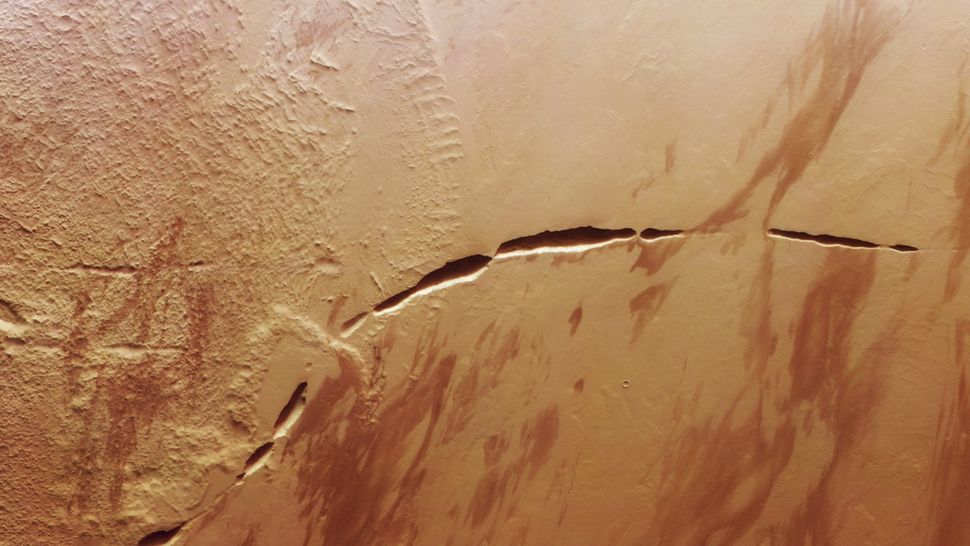Science
Related: About this forumGrand Canyon-size 'scar' on Mars revealed like never before in striking new satellite photos
By Harry Baker published 12 hours ago
New photos from the European Space Agency's Mars Express orbiter give us our best look yet at a giant ravine on the Red Planet. The dark "scar" was likely birthed by a gigantic blob of magma hidden beneath a massive nearby volcano millions of years ago.

A satellite photo of mars with a massive, curved crack in its surface
The giant "scar," known as Aganippe Fossa, is around 375 miles long from end to end. (Image credit: ESA/DLR/FU Berlin)
A satellite orbiting Mars has captured the best-ever images of a gigantic "scar" carved across the Red Planet's surface.
The dark ravine, which is accompanied by unusual zebra-like stripes, is likely the result of extreme volcanic activity millions of years ago.
The striking surface feature, named Aganippe Fossa, is a graben — a "ditch-like groove with steep walls on either side," according to the European Space Agency (ESA). Astronomers first spotted it as early as 1930 but only officially named it in 1976, according to the U.S. Geological Survey.
The graben is incomplete, with various breaks in the groove from end to end, but it is considered to be a single structure that stretches around 375 miles (600 kilometers). That is longer than the Grand Canyon, which is 277 miles (446 km) from one end to the other, according to the National Park Service. However, the structure is still significantly shorter than Mars' Valles Marineris — the largest canyon in the solar system, which runs for more than 2,500 miles (4,000 km) along the Red Planet's equator.
ESA's Mars Express orbiter captured the newly released photos on December 13, 2023. The satellite has been circling the Red Planet on an elliptical orbit for more than two decades.
More:
https://www.livescience.com/space/mars/grand-canyon-size-scar-on-mars-revealed-like-never-before-in-striking-new-satellite-photos
BComplex
(9,748 posts)NJCher
(42,473 posts)The square.
love_katz
(3,200 posts)Your posts are the antidotes that I need to remind myself that intelligence still lives. With all the idiocy being posted, your subjects are soothing and healing. ![]()
Judi Lynn
(164,049 posts)Fortunately, something will remind you just in time that there is still a very huge world of people left who are not
going to stop their progress, regardless. They have always been there, keeping a higher realm working for us, in spite of all efforts to wreck it all.
It's a perfect time to gain access to something like the Internet(S)! (The Republican Senator Ted Stevens from Alaska did explain to us during the Bush years that the Web is all a "series of tubes" which made it all so much easier to understand!) ![]()
![]()
Your post was deeply kind, love katz, more than you would imagine. It came at a time which really touched me. Very unexpected. Thank you, so much. ![]()